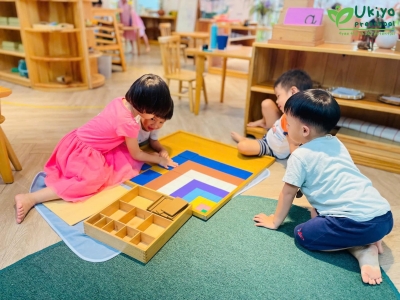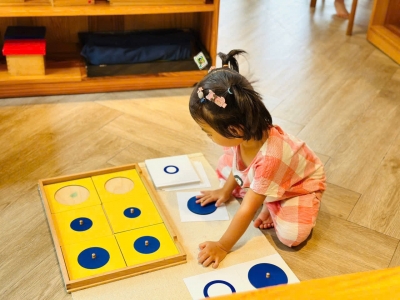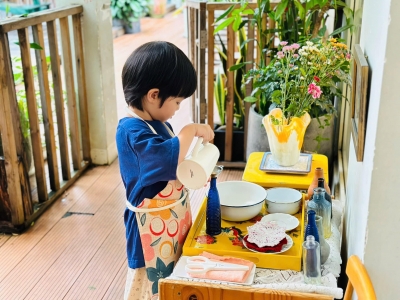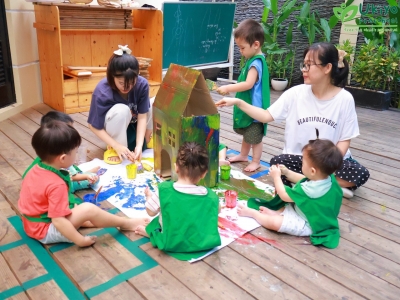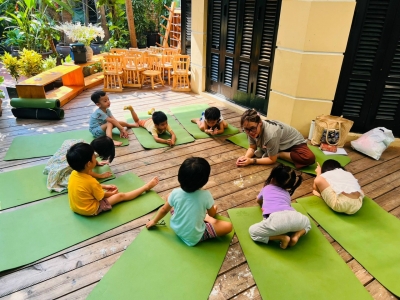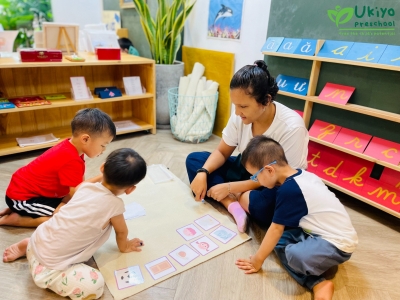WHEN YOUR CHILD KNOWS BETTER THAN YOU
If a foolish mother frog said to her little tadpoles in the pool, “Come out of the water, breathe the fresh air, enjoy yourselves in the young grass, and you will all grow into strong healthy little frogs. Come along now, mother knows best!” and the little tadpoles tried to obey, it would certainly mean the end of the tadpoles.
And yet that is how so many of us are trying to bring up our children. We are eager to see them grow into intelligent, useful citizens, with fine characters and good manners. And so we spend our time and patience correcting them, telling them to do this, not to do that, and when they want to know, “Why, Mummy?”, we don’t stop to find out why we interfere, but put them off with “Mother knows best.”
We are in exactly the same position as the foolish frog if only we could see it. This young life that we are trying to mold needs no forcing and squeezing, no correcting or fault-finding to develop its intelligence and character. Nature looks after children in the same way as she sees that the tadpole grows into a frog when the time is ready.
“But,” I can hear you say, “shall we leave our children to do as they like? How can they know what is best for them when they have had no experience? And think what little savages they would grow up to be if we did not teach them manners . . .” And I would answer, “Have you ever given your children a chance even for one day to do what they like without interference?”
Try it and you will be astonished. Watch and see how something catches their interest. Perhaps they see you turn a key in the lock and want to do it too, or help you sweep, or just make some funny little pattern with pebbles on your tidy floor, and on any ordinary day you would say, “Don’t get in the way, play with your toys.”
But today give them the key, try to find a little brush for them to sweep with, leave the pattern on the floor and see how absorbed they become. It is often not enough for children to do a thing once or twice, but they will perform the same simple action over and over again until they seem to have satisfied some inner urge. You will be surprised how they keep out of mischief when they are allowed to busy themselves with something that really interests them.
But if you interfere impatiently and stop some absorbing occupation, you will destroy your child’s concentration and perseverance – valuable lessons he is teaching himself –, he will be dissatisfied and filled with a sense of disappointment and restlessness, and may very likely find an outlet in deliberate mischief.
And what is this troublesomeness that we are so afraid of if we do not correct small children? We say that we correct them for their own good, and a great deal of the time we honestly believe it. But it is strange how often what we feel to their good amounts to the same thing as our own comfort. We are all so busy with our grown-up, froggy work that we forget that the little tadpoles have work of their own to do: the work of growing into men and women.
And this is work that only they can do. The greatest help we can give them is to stand by and see that they are free to develop in their own way. We can on the other hand make their work very hard. If we persist in saying “Mother knows best,” and try to form their growing intellects and characters by our own standards, we shall succeed only in destroying self-discipline, we shall break the child’s power of concentration by trying to focus his attention on matters which he is not yet interested in, and he will grow deceitful if we insist too harshly.
But if we change our whole attitude and say to ourselves, “My child knows what is best for him. Let us of course watch that he comes to no harm, but instead of trying to teach him our ways let us give him the freedom to live his little life in his own way,” then perhaps, if we are observant, we shall learn something about the ways of childhood.
This is a new way to look at the problem of responsibility which weighs so heavily on many parents. Those of us who have tried to learn the ways childhood from children (instead of from our own ideas) have been amazed at the discoveries we have made. And there is one point on which we all agree: children live in a world of their own interests, and the work they do there must be respected, for although many activities of children may seem pointless to grown-ups, nature is using them for her own ends. She is building mind and character as well as bone and muscle.
The greatest help you can give your children is the freedom to go about their own work in their own way, for in this matter your child knows better than you.
(Chapter 6, Maria Montessori Speaks to Parents Book)
Others



